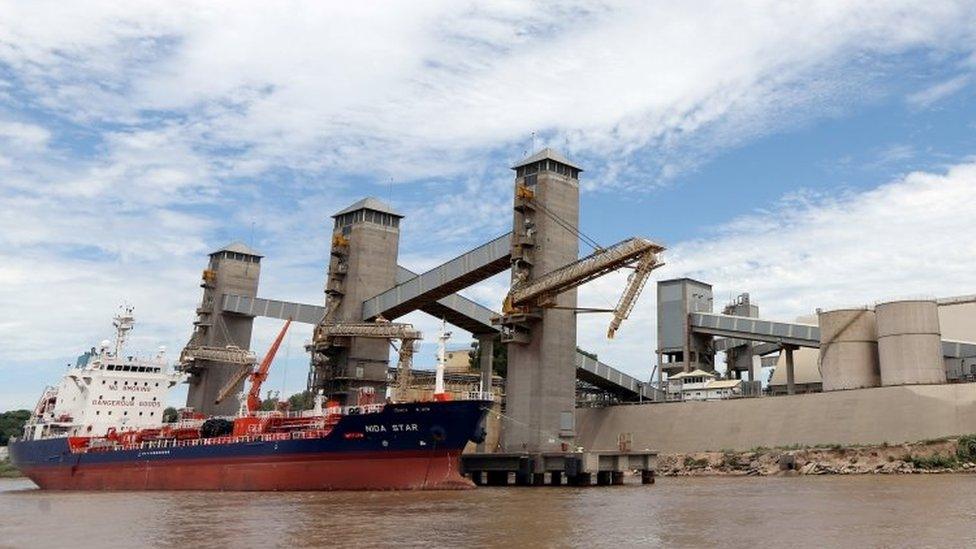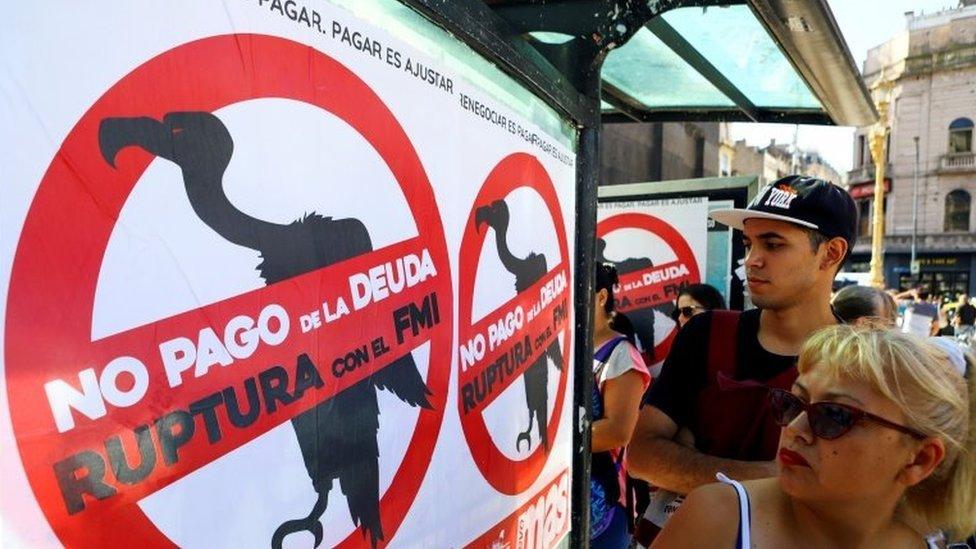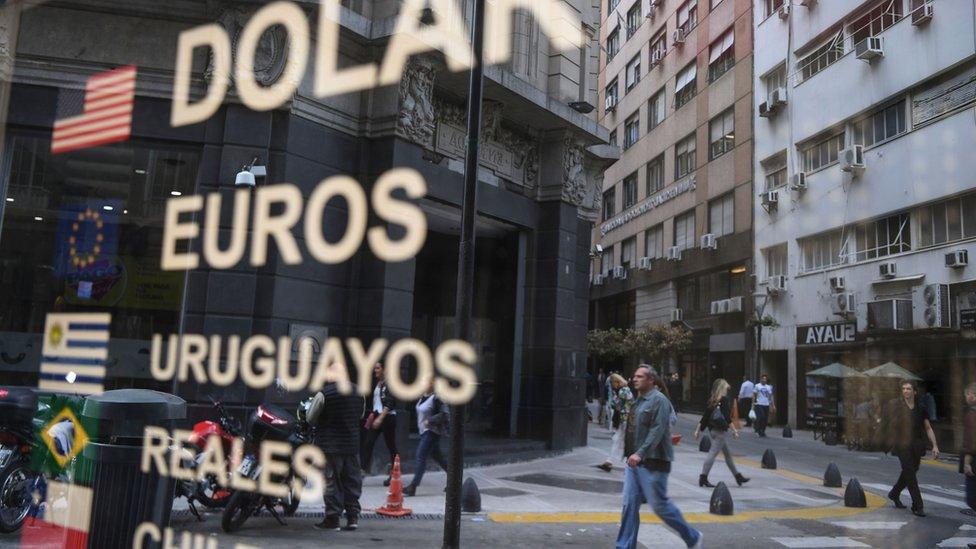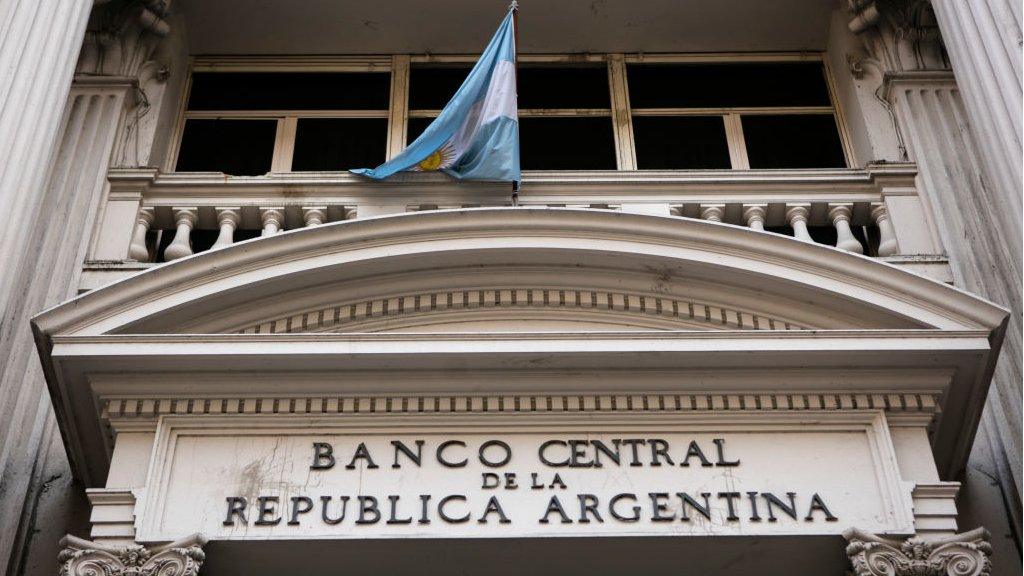Argentina debt talks deadlocked as deadline looms
- Published

The Argentine government says it cannot meet the interest payments at present
The Argentine government has extended a deadline to restructure $65bn (£53bn) of debt to 22 May in an effort to avert further financial turmoil.
Argentina had asked private bondholders to accept significantly lower interest payments and to defer those payments until 2023.
Most bondholders rejected the offer.
The government says it cannot afford to make the payments amid the coronavirus pandemic but non-payment could make it almost impossible to get future loans.
Governments often choose to finance spending by issuing bonds - this means they are loaned money by investors who expect to be paid a certain amount of interest for a number of years before they are repaid the amount that was borrowed.
The interest rate governments pay depends on how high investors think the risk is that they might fail to make a payment (known as a default).
What's the context in Argentina?
At the end of 2019, Argentina had racked up $323bn of debt, the equivalent of 88% of its gross domestic product, according to International Monetary Fund figures.
On 10 December, the centre-left politician Alberto Fernández was sworn in as Argentina's new president.
In his inaugural speech, Mr Fernández warned that while Argentina was willing to repay its debt, it needed the economy to grow before it could make the payments.
Much of Argentina's debt is priced in US dollars and the recent slide of the value of the local currency, the peso, against the dollar has made interest payments dearer.
Argentine exports currently do not generate enough foreign currency to repay the massive debt.

Argentina's exports do not raise enough foreign currency to pay the debts
That is why the president has tried to restructure some of the debt in order to delay payments and buy his government time.
His government approached international creditors holding $65bn worth of bonds with an offer which included a three-year grace period in which Argentina would not have to pay interest, as well as a chunky cut to Argentina's interest payments.
While some creditors agreed that Argentina should be given more time to repay, many balked at the interest rate cut and no deal was reached by Friday, the deadline Argentina had set.
Some creditors also reportedly did not like the take-it-or-leave-it approach of the Argentine government.
Now Argentina has extended that deadline to 22 May, the day on which it is due to repay $500m in interest.
President Fernández said he hoped the creditors would now come up with a counterproposal and that the two sides could still reach an agreement by that date.

Will bondholders go easy on Argentina?

Even before coronavirus hit, Argentina's economy was in crisis. But then the Fernández administration shut the country down quickly, with some of the toughest lockdown measures in the region.
And although that's helped keep the number of deaths from Covid-19 relatively low, it's ravaged a country desperate for a break. Default would be even more devastating.
What happens next, though, is uncertain. Last week a group of leading economists including Nobel prize-winner Joseph Stiglitz urged bondholders to act in good faith, arguing that debt relief is the only way "to combat the pandemic and set the economy on a sustainable path".
But after extended debt negotiations, will bondholders stick to their guns and only accept a deal on their terms? Or could they go easy on Argentina in the circumstances? After all, the whole world is in economic meltdown. Argentina may be one of the first countries to teeter towards default but it won't be the last.

Why does it matter?
If the two sides fail to reach an agreement by 22 May and Argentina does not make the $500m interest payment due on that day, the country will be in default.
Being in default can have severe consequences. Argentina has been there before, most notably in 2001, when it failed to meet its debt repayments amid a wider economic and political crisis which saw the country go through five leaders within a matter of weeks.
People's savings accounts were frozen to stop a run on the banks and violent street protests led to dozens of deaths.

External debt and its repayment is a controversial topic in Argentina
The effect on Argentines was devastating with many seeing their hard-won prosperity quickly disappearing.
That default also led to Argentina being seen as an unreliable debtor. It became embroiled in a decade of legal battles about how to restructure and repay those debts.
There have been further defaults since, by some counts a total of eight, although the government disputes that number.
A further default on 22 May would no doubt cause further financial turbulence amid the upheaval already caused by the coronavirus pandemic.
- Published2 September 2019

- Published21 August 2019
